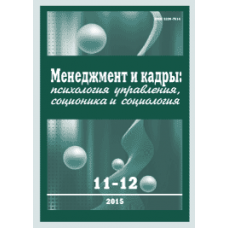Номер № 11-12/2015 журналу «Менеджмент і кадри: психологія управління, соціоніка та соціологія»
Нові технології
Соломко Л.Р.
< h4>Можливість отримати реальні конкурентні перевагиРозглянуто можливості соціоніки як практичного інструменту для роботи з колективами будь-якого рівня складності. Показано принципову перевагу системи соціоніки як теорії психіки та інтертипних відносин перед типовою поведінкою Майєрс-Бріггс та іншими типологічними системами.
Ключові слова: менеджмент, соціоніка, конкуренція, психологія управління, бізнес, типознавство.
Інструменти менеджменту
Скварко В.В.
Емоційний бізнес
Описано роль емоцій у бізнесі.
Ключові слова: емоції, бізнес, конкуренція, продажі.
Теорія менеджменту< /h3> Попов В.П., Крайнюченко І.В.
Еволюція конкуренції та кооперації в природі та суспільстві
Досліджується самоорганізація складних природних систем. Дарвінська боротьба за виживання (конкуренція) має місце на нижніх щільно заселених поверхах ієрархії. Найвищі рівні гармонізовані завдяки кооперації. Недоліки конкурентного ринку є наслідком невідповідності законам природної гармонії. Потрібно гармонізуюче державне управління.
Ключові слова: системи, гармонія, конкуренція, кооперація, управління.
Інформаційна структура суспільства
Букалов А.В .
Аналіз історичних процесів
Методи інтегральної соціоніки показують обмеженість і недосконалість. безлічі приватних теорій історичного процесу. Тільки синтез цих теорій з урахуванням концепції інформаційної структури суспільства та стадій його еволюції дозволяє дати всебічну картину історичного процесу. На прикладі аналізу низки процесів давньої історії показано застосування принципів інтегральної соціоніки у синтезі та узагальненні низки теорій історичного процесу.
Ключові слова: інтегральна соціоніка, суспільство, інформаційні аспекти, історія, концепція Тойнбі теорія Л.Гумільова, давня історія.
Дослідження
Гуленко В.В.
Експеримент з вивчення ознаки «квестимність-деклатимність»
Описаний моделюючий експеримент, організований і проведений автором, аналізу прояву ознаки «квестимність–деклатимність» при взаємодіях у малих групах.
Ключові слова: соціоніка, що моделює експеримент, квестим, деклатим.
Карпенко О.Б., Букалов А.В., Чикірісова Г .В.
Відсутність зв'язку між соціонічними типами та астрологією.
Проаналізовано статистику дат народження представників соціонічних типів (типів інформаційного метаболізму) за знаками Зодіаку та за роками східного гороскопу. На вибірках понад 2500 осіб. показано відсутність залежності типу від дати народження.
Ключові слова: соціоніка, соціонічний тип, психологічний тип, знак Зодіаку, східний гороскоп.
Методи соціоніки
< h5>Тихонов А.П.Соціоніка та психіка
Спроба психологічного дослідження наявності «концептуальних мостів» між соціонікою та психологією. Розглянуто окремі питання системної організації інформаційних процесів у психіці людини, основні положення теорії інформаційного метаболізму. Кемпінського, а також особливості ТІМу як багаторівневої структури. Робиться висновок про те, що саме ТІМ людини, що є багаторівневою базовою функціональною системою, виступає сполучною ланкою при дослідженні різних психічних явищ і дозволяє простежити виявленість в одному індивідуумі багатомірності, багаторівневості, полідетермінації та ієрархічності різних психічних явищ. слова: інформаційний метаболізм, психіка, системний підхід, структура, ТИМ, теорія функціональних систем. аспектів інформаційного потоку за допомогою ознак Юнга: сенсорика-інтуїція, логіка-етика, екстраверсія-інтроверсія, раціональність-ірраціональність.
Ключові слова: соціоніка, психологія, аспекти інформаційного потоку, ознаки Юнга, сенсорика, інтуїція, логіка, етика, екстраверсія, інтроверсія, раціональність, ірраціональність. /p>
Леонтьєв В.О.
Прояви соціонічного типу та зовнішні умови
Детально розглянуто відповідність між ТІМами та ВВ. Введено поняття базису ІВ. Встановлено співвідношення між окремими зв'язками ІО та аспектами ТІМу, а також відповідальність їх за звичайні властивості ІО, які розуміються відповідно до наведених ухвал. Отримано залежність ТІМу людини від зовнішніх умов.
Ключові слова: соціоніка, базис ІО, вплив зовнішніх умов на ТІМ, аспекти ІО.
Психологія та соціоніка
Рейнін Г.Р.
Тип і типологія в психології
Запропоновано теоретичний опис структури особистісних властивостей з позиції уявлень про тип та типологію. Зіставлення найпоширеніших факторних методик дослідження особистості показало, що особистісні методики використовують переважно 15 ± 5 факторів, ортогоналізація яких дає четвірку незалежних факторів. Зіставлення трьох клінічних типологій дозволяє виділити 16 типів особистості. Стільки ж типів виділяють найрозвиненіші теоретичні типології. На основі системного аналізу літературних даних сформульовано гіпотезу про існування єдиної 16-елементної типології особистості, що реалізує ідею взаємопов'язаності та додатковості типологічного та факторного підходів.
Ключові слова: тип, типологія, факторні описи особистості, соціоніка , психологія.
Summary
Менеджмент і кадри 11-12/2015
- Модель: выпуск журнала «Менеджмент и кадры…»
-
$3.00
- Ціна в бонусних бали: 30

